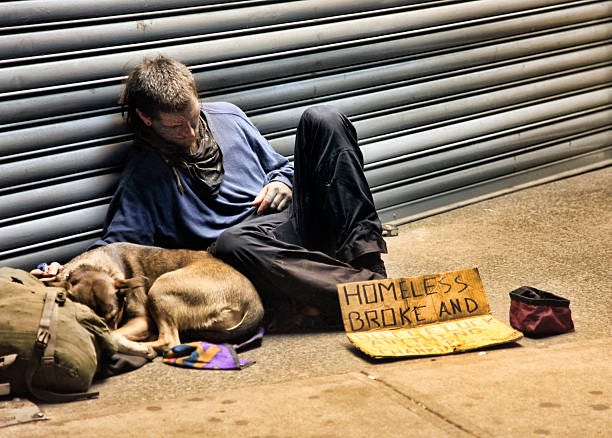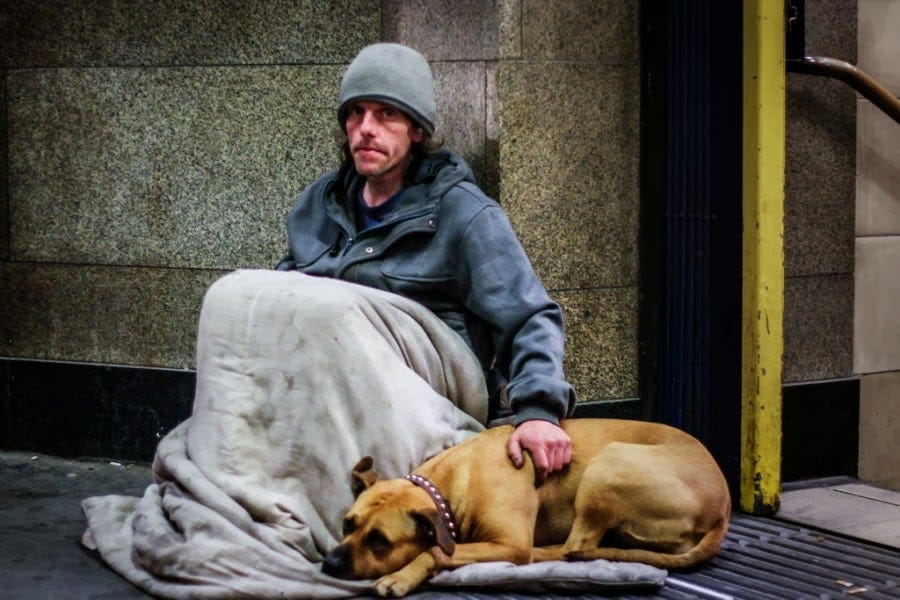A recent revelation has sent shockwaves through the animal welfare community: In an exposé by MSN News, animal‑rights activist Rebecca Corry reveals that dogs on L.A.’s Skid Row are “suffering and dying in plain sight,” yet city officials are doing virtually nothing to stop it. She reports canines locked in brutal heat without water, being used as drug testers by IV users, used for illicit breeding, visibly injured, and—even more horrifying—allegedly drugged and trafficked, all while the city “turns a blind eye”. These distressing images have reignited an urgent and complex question: Should people experiencing homelessness be allowed to keep pets?
The emotional bond between a person and their animal often becomes a lifeline in the harsh reality of homelessness. According to the ASPCA, pets serve as crucial sources of companionship, “a sense of responsibility and a reason to live,” reducing substance use and motivating owners to seek medical help—all vital anchors in an unstable life. A former unhoused individual featured by Invisible People expressed it plainly: their dog was the only thing stopping them from giving up altogether. This phenomenon, sometimes called the “Pack of Two,” reflects not merely affection but deep interdependence, with pets offering emotional sustenance critics rarely acknowledge.
Yet amidst this bond are troubling realities illustrating the darker side of neglect and systemic failure. Los Angeles Magazine documented animals found caged in heat so extreme they were too weak to stand, exposed to drugs, and exploited for breeding or trafficked. Corry’s allegations of city inaction suggest these abuses are not isolated but part of a broader pattern of disregard, raising difficult ethical and legal issues about the welfare of these vulnerable animals. One major barrier deepening this crisis is housing. The ASPCA notes that nearly half of pet‑owning unhoused individuals have been turned away from shelters due to no‑pet policies, and many forgo shelter altogether rather than leave their animal behind. Such exclusions fragment support systems, deepen isolation, and can prolong homelessness. Legislative efforts like the federal “PUPP Act” and California’s co‑sheltering initiatives aim to remedy this by funding pet‑friendly shelter retrofits, mobile veterinary clinics, and more nuanced support that keeps families intact.
Critics argue that allowing pets in these environments may put animal welfare and public safety at risk. Without routine care—vaccinations, vet checkups, or shelter—animals can suffer from disease or inflict harm. Overcrowded encampments might exacerbate these risks, especially if oversight is lacking. While many unhoused pet owners go to extraordinary lengths to support their animals—even feeding them before themselves—a significant minority lacks access, unintentionally leaving their pets vulnerable.
DOGS OF SKID ROW
The Skid Row crisis highlights precisely why a balanced response is essential. Instead of blanket bans or unchecked access, advocates propose a compassionate middle path: invest in pet‑inclusive shelters, deploy mobile vet units, and enforce anti‑cruelty laws with precision and humanity. The focus must be on preventing exploitation—drugging, breeding mills, and neglect—while still honoring the profound healing power pets offer their unhoused owners.
At the heart of this debate is a single, pressing question: can society build systems where no one—human or animal—is forced to suffer due to poverty and neglect? If a pet provides a person with purpose, motivation, or hope, then stripping them of that bond may worsen their plight. At the same time, letting that bond fray through neglect is not compassion. We must strive to create humane policies that value both dignity and protection: shelters that welcome pets, support that covers vet care, and laws that penalize cruelty while nurturing connection.
In the end, the dogs of Skid Row are not just symbols of a broken system—they are sentinels. How we respond to their pain and to the people who love them will define our capacity for empathy and justice. Our challenge is not whether the homeless deserve pets—but whether we, as a society, are willing to do what it takes to support that essential partnership and protect both ends of the leash.
What say you?





